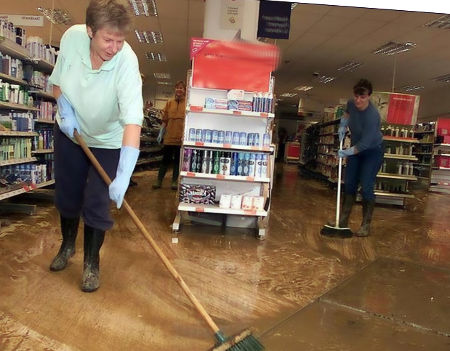
It is nice to live life without worrying about all the nasty things that could potentially happen to your business. But it’s also wise to give them a passing thought at some point, and put some kind of protection or recovery plan in place. Then allow yourself proper peace of mind instead of just that nervous sense of pretending it will never happen so long as you don’t think about it 🙂
Flood doesn’t just mean tsunami or the river bursting it’s banks. Yes, those are real risks to some businesses depending on their geographic locations. There is a risk to every business though simply because water is all around is in pipes and sewerage systems. Even if your premises or office doesn’t have any plumbing, it’s very likely the building around you does. Or your neighbors do. Or the water main runs past your front door under the street.
A burst pipe can cause horrendous damage just in one night and stop your business in it’s tracks. Whereas a slow hidden leak can be even worse – once discovered major damage has normally already happened, which can mean rotten floorboards and even structurally compromising damage.
It doesn’t even have to be plumbing related. Torrential rain can find it’s way through weak points in the roof or windows, and you can arrive at your office or shop one morning to find a small lake on the floor and seriously damaged equipment or stock.
All of which is doom and gloom. But it’s easy to just accept the potential, and make a plan.
Firstly, have a disaster recover plan in place. It can be the same plan for fire, flood, earthquake or whatever. Just add in contact details for a couple of local flood damage clean up companies, and you’ll be good to go. The sooner you can get the professionals in to clean up the mess, the sooner you’ll be back up and trading again.
Also include in your plan details of exactly where all the shut off valves are for the water supply. Because the sooner you can cut off a leak, the less damage there is going to be. And make sure the shut off valves/taps are accessible – it wouldn’t be the first time I’d seen the access behind a locked door, padlocked access panel or even sealed shut behind tiling! Make sure you know where they are now, that you can access them, that they actually do shut off what you think they shut off and that they work. They should NOT require extra tools, or superhuman strength to turn them – because the only person on site at the time may not be superhuman strong.
That’s one line of defence.
You may also want to consider flood insurance too. Depending on where your business is, and the associated risks, this may be either perfectly affordable or simply impossible due to the level of risk. It’s worth investigating however. You may think your standard insurance policy covers flooding – I would recommend reading it closely or having that conversation with your insurer. It’s likely the cover is not nearly as extensive as you think. It may also not provide any cover for the loss of trade during the time the damage is being cleaned up or repairs made to your building. It may also not cover stock, or equipment damage to the extent that you would expect.
The Small Business Administration has more information on coping with disaster recovery, including disaster cleanup. They also open up flood recovery centres as and when required to help local businesses get back on their feet (most recently in Kanawha and Greenbrier counties).